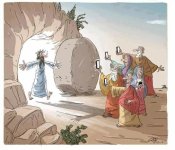Perceived as a threat to the religious and political establishments.
I enjoy the historical details in Luke's account especially the jurisdictional shuffling and subsequent reconciliation between Herod and Pilate
Gospel of Luke Chapter 23
Then the whole assembly rose and led him off to Pilate. And they began to accuse him, saying, ?We have found this man subverting our nation. He opposes payment of taxes to Caesar and claims to be Messiah, a king.?
So Pilate asked Jesus, ?Are you the king of the Jews??
?You have said so,? Jesus replied.
Then Pilate announced to the chief priests and the crowd, ?I find no basis for a charge against this man.?
But they insisted, ?He stirs up the people all over Judea by his teaching. He started in Galilee and has come all the way here.?
On hearing this, Pilate asked if the man was a Galilean. When he learned that Jesus was under Herod?s jurisdiction, he sent him to Herod, who was also in Jerusalem at that time.
When Herod saw Jesus, he was greatly pleased, because for a long time he had been wanting to see him. From what he had heard about him, he hoped to see him perform a sign of some sort. He plied him with many questions, but Jesus gave him no answer. The chief priests and the teachers of the law were standing there, vehemently accusing him. Then Herod and his soldiers ridiculed and mocked him. Dressing him in an elegant robe, they sent him back to Pilate. That day Herod and Pilate became friends?before this they had been enemies.
Pilate called together the chief priests, the rulers and the people, and said to them, ?You brought me this man as one who was inciting the people to rebellion. I have examined him in your presence and have found no basis for your charges against him. Neither has Herod, for he sent him back to us; as you can see, he has done nothing to deserve death. Therefore, I will punish him and then release him.?
But the whole crowd shouted, ?Away with this man! Release Barabbas to us!? (Barabbas had been thrown into prison for an insurrection in the city, and for murder.)
Wanting to release Jesus, Pilate appealed to them again. But they kept shouting, ?Crucify him! Crucify him!?
For the third time he spoke to them: ?Why? What crime has this man committed? I have found in him no grounds for the death penalty. Therefore I will have him punished and then release him.?
But with loud shouts they insistently demanded that he be crucified, and their shouts prevailed. So Pilate decided to grant their demand. He released the man who had been thrown into prison for insurrection and murder, the one they asked for, and surrendered Jesus to their will


